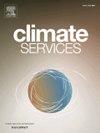Towards CS4L&D: Advancing climate services for loss and damage
IF 4
3区 环境科学与生态学
Q2 ENVIRONMENTAL SCIENCES
引用次数: 0
Abstract
Losses and damages from climate change are not just a future risk but already a present reality, and “Loss and Damage” (L&D) as a policy domain has been formalised under the United Nations Framework Convention on Climate Change (UNFCCC), alongside mitigation and adaptation. While climate services currently provide strong support for adaptation and disaster recovery, here we propose that an expanded set of climate services for L&D (CS4L&D) should be developed to help address climate justice implications of realised losses and damages. CS4L&D could pragmatically connect research on climate hazards and lived experiences of impacts with global political negotiations on L&D and transformative climate action and justice. Existing disaster databases and extreme event attribution services could be enhanced with knowledge relevant for L&D, including information on exposure, vulnerability, adaptive capacity, financial support, and governance. Existing disaster forensics tools could be enriched with knowledge on L&D in the UNFCCC context, including the political and legal implications of evidence these tools provide. A broadening from risk management to climate justice also awakens new possibilities for climate services. An expansion of climate services for L&D would contribute to climate justice by substantiating the L&D mechanism under Article 8 of the Paris Agreement and the claims for compensating L&D in climate litigation and activism. Novel users (and co-producers) of climate services for L&D might be legal professionals, journalists, affected communities, and activists, in addition to the traditional users such as planners, consultants, and decision-makers. We encourage the L&D and climate services communities to begin to co-develop with stakeholders such climate services for L&D.
求助全文
约1分钟内获得全文
求助全文
来源期刊

Climate Services
Multiple-
CiteScore
5.30
自引率
15.60%
发文量
62
期刊介绍:
The journal Climate Services publishes research with a focus on science-based and user-specific climate information underpinning climate services, ultimately to assist society to adapt to climate change. Climate Services brings science and practice closer together. The journal addresses both researchers in the field of climate service research, and stakeholders and practitioners interested in or already applying climate services. It serves as a means of communication, dialogue and exchange between researchers and stakeholders. Climate services pioneers novel research areas that directly refer to how climate information can be applied in methodologies and tools for adaptation to climate change. It publishes best practice examples, case studies as well as theories, methods and data analysis with a clear connection to climate services. The focus of the published work is often multi-disciplinary, case-specific, tailored to specific sectors and strongly application-oriented. To offer a suitable outlet for such studies, Climate Services journal introduced a new section in the research article type. The research article contains a classical scientific part as well as a section with easily understandable practical implications for policy makers and practitioners. The journal''s focus is on the use and usability of climate information for adaptation purposes underpinning climate services.
 求助内容:
求助内容: 应助结果提醒方式:
应助结果提醒方式:


